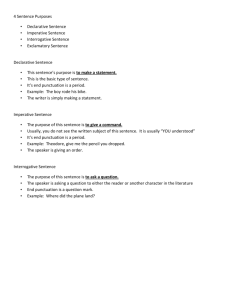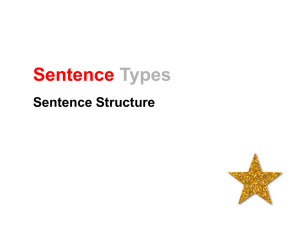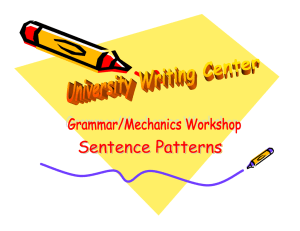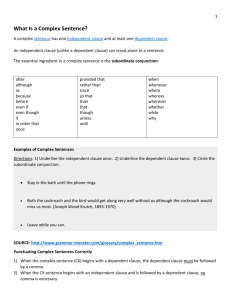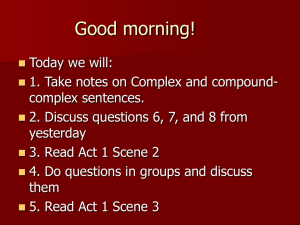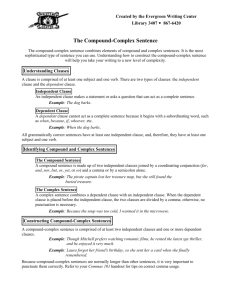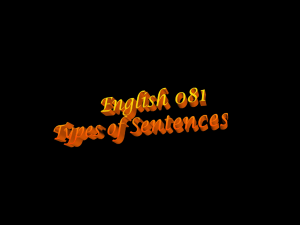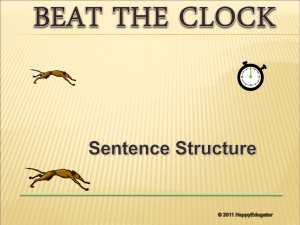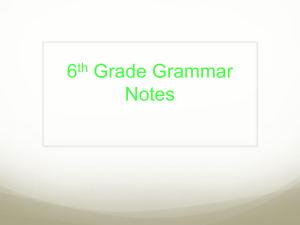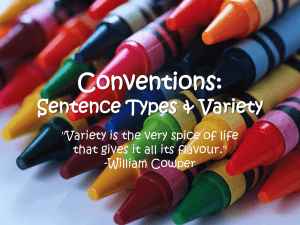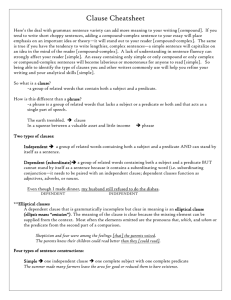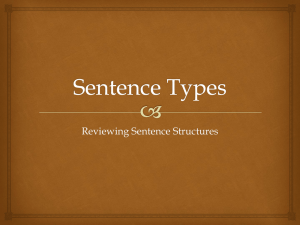File
advertisement
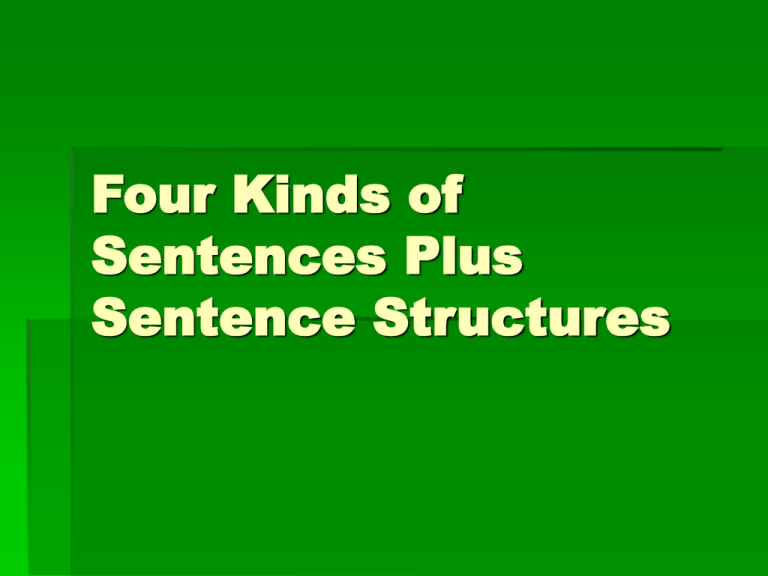
Four Kinds of Sentences Plus Sentence Structures Simple One Independent clause A subject and a predicate (verb) Ex: Christopher Columbus sailed for Spain. Independent Clause Can be on its own just like this lady. Compound Two independent clauses joined by a conjunction and separated by a comma Conjunctions: FANBOYS For, and, nor, but, or, yet, so Ex: John Cabot reached the east coast of North America, but he never made it back to England. Compound 2 independent clauses can be on their own like these people, but choose to be together. A sentence is joined by a conjunction and a comma. They are joined by their hands. 8th Grade Exercise 1-Identify the Subject and Verb 1. As protection from such weapons, warriors in battle needed special equipment. 2. Some warriors used shields of wood or animal hides. 3. In ancient Assyria, soldiers wore leather armor with bronze reinforcements. 4. By 1800 B.C., the Greeks had made the first metal armor out of bronze. 5. Later, the Romans manufactured strong iron armor and designed special equipment such as shinguards. 8th Grade Exercise 3-Identify the Subject and Verb Label as Simple or Compound 1. Over the years, African American performers have earned much acclaim and won a number of Academy Awards. 2. Hattie McDaniel won an Oscar for her role in Gone with the Wind in 1939. 3. Sidney Poitier acted in stage plays and made several movies early in his career. 4. Poitier won an Oscar in 1963 for Lilies in the Field, and he later made many popular films. 5. McDaniel and Poitier were the first African Americans to receive Academy Awards. 7th Grade Exercise 1-Identify the Subject and Verb 1. My favorite escape from city life is the green world of Central Park in New York City. 2. Its beautiful woods and relaxing outdoor activities are just a few minutes from our apartment. 3. The enormous size of the park, however, can sometimes be a problem. 4. Often, I take this map with me for guidance. 5. Using the map, I can easily find the zoo, the band shell, and the Lost Waterfall. 7th Grade Exercise 3-Identify the Subject and Verb Label as Simple or Compound 1. The Amazon River is located in South America and is one of the longest rivers in the world. 2. The Amazon begins in Peru, and it flows across Brazil to the Atlantic Ocean. 3. The river carries more water than any other river and drains about one fifth of the earth’s entire freshwater supply. 4. The Amazon is actually a network of several rivers, but most people think of these combined rivers as only one river. Complex Independent clause and a dependent clause Joined together by a “dependent” word such as when, because, even though Because Portugal found a sea route to Asia, it gained control of trading. Portugal gained control of trading because it found a sea route to Asia. Complex A complex sentence is like a parent and a child. The parent is independent, and the child is dependent. Compound-Complex A compound-complex sentence has two independent clauses joined by a conjunction and at least one dependent clause Compound + Complex = Compound-Complex Ex: Although John Cabot found new sea routes to North America, he never made it back to England, and he was believed to have died at sea in a storm. Compound-Complex A compound-complex sentence is like having two parents and a child. The two parents are two independent clauses joined by a conjunction FANBOYS The child is a dependent clause and joins the sentence with a “dependent” word such as when, because, even though… Kinds of Sentences Declarative: a statement. Imperative: command Exclamatory: shows emotion! Interrogative: question? Look at Four Kinds of Sentences Plus Sentence Structures Worksheet Read the simple sentences. Circle the subject and underline the verb in each sentence. Highlight the word or punctuation that helps you figure out the kind of sentence. Compound Sentence Practice Read the compound sentences. Circle the comma and conjunction. Underline both independent clauses. Highlight the word or punctuation that helps you figure out the kind of sentence. Complex Sentence Practice Read the complex sentences. Underline the independent clause once. Underline the dependent clause twice. Circle the dependent word. Highlight the word or punctuation that helps you figure out the kind of sentence. Compound-Complex Practice Reread the complex and compound sentences. How can we combine them to make a compound-complex sentence that makes sense? You might not use all parts of both sentences. Ex: Before you get here, where do you like to go for dinner, and where would you like to meet? Compound-Complex Practice On the back of the chart, write 2 more compound-complex sentences. Identify Go swimming. Simple and imperative When do you want to go to the beach, and where do you want to go? compound and interrogative I would love it if you went swimming with me! If you went swimming with me, I would love it! Complex and exclamatory Writing Try to write different kinds of sentences with different sentence structures on your worksheet. On the back write at least 2 sentences that are compound-complex related to the topic. Use summer as your topic.
